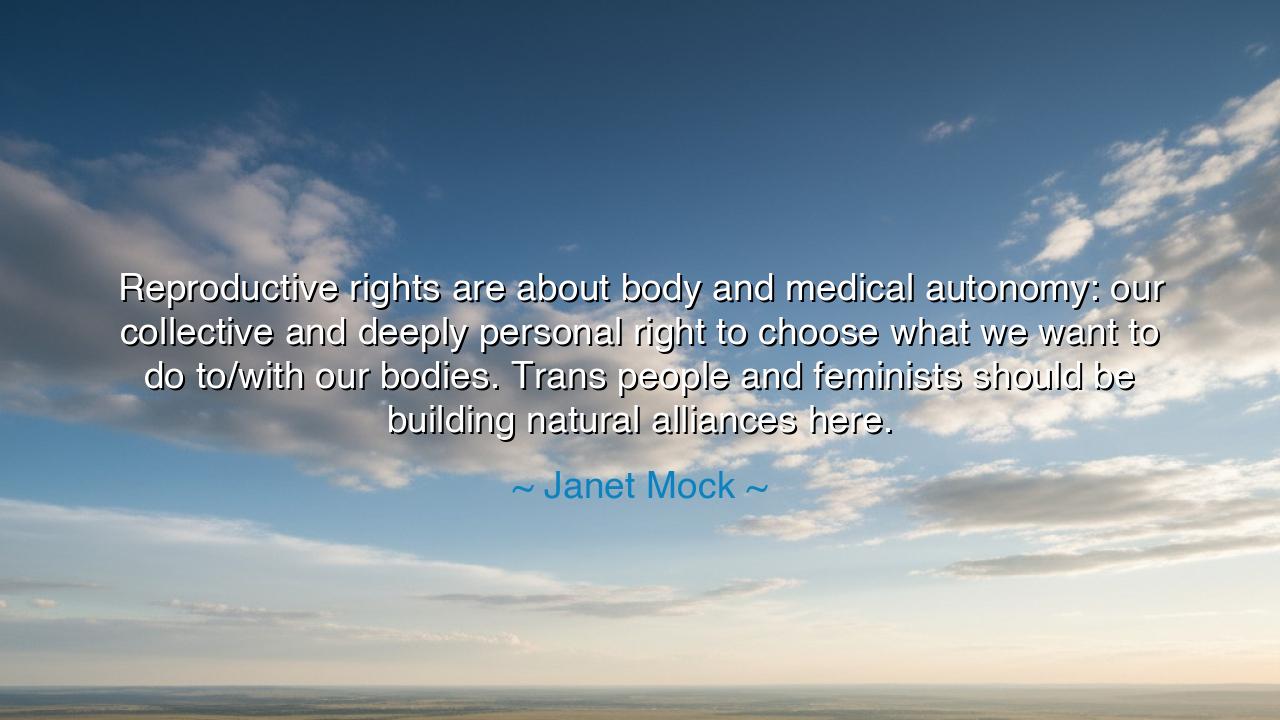
Reproductive rights are about body and medical autonomy: our
Reproductive rights are about body and medical autonomy: our collective and deeply personal right to choose what we want to do to/with our bodies. Trans people and feminists should be building natural alliances here.






Hear now the words of Janet Mock, who speaks not only for herself, but for generations past and those yet to come: “Reproductive rights are about body and medical autonomy: our collective and deeply personal right to choose what we want to do to/with our bodies. Trans people and feminists should be building natural alliances here.” In this utterance there is both fire and tenderness, a cry of defiance and a vision of unity. She speaks of autonomy, the sacred power of self-direction, without which freedom itself is hollow. She speaks also of alliances, for no struggle endures if fought in solitude.
From the beginning of civilization, rulers and priests have sought dominion not only over the land and the people, but even over the body—the most personal temple of existence. Ancient laws dictated who might bear children, who might enter sacred orders, who might wed and who might not. In many lands, women were regarded not as sovereign beings, but as vessels whose destinies were bound to the will of men. To resist this control has always been to claim something divine: the right to shape one’s own flesh and fate.
So too do we find a parallel in the story of Hypatia of Alexandria, the philosopher who walked proudly in the fourth century. A woman of wisdom in a time when women were expected to bow in silence, she taught mathematics and astronomy, holding mastery of her mind and body as inseparable. Yet she was destroyed by those who feared her autonomy, by those who believed her existence a threat to their order. Her death is a wound carved into history, a reminder that the fight for autonomy is ancient and perilous.
Janet Mock’s words call forth a vision beyond division. She reminds us that the struggles of trans people and feminists are woven from the same cloth. Both seek to break the chains of imposed identity, both rise against the decree of others who would claim lordship over their bodies. These alliances are not manufactured but natural, born of shared experience and shared yearning for liberation. The oppressor thrives on division, but the oppressed find strength in unity.
In these words there is also tenderness: the recognition that the right to decide—to bear or not to bear, to transition or not to transition, to shape one’s path of care and healing—is both collective and deeply personal. It is collective, for when one body is denied autonomy, all are endangered; it is personal, for no one but the self can live within the skin that must daily endure. To honor this dual truth is to hold both justice and compassion in our hands.
The lesson, then, is that the battles for reproductive rights and for trans liberation are not separate rivers but branches of one great stream. To ignore one is to weaken both. Just as the Spartans and Athenians, divided by pride, nearly destroyed themselves against a common foe, so too would feminists and trans people risk defeat if they stand apart when they should be bound together in purpose.
And so I say to you, children of the future: do not falter in the defense of your own body’s sovereignty, nor in the defense of another’s. Speak boldly in public squares and quietly in your households, so that no silence can be mistaken for consent. Stand with those whose autonomy is threatened, even if their struggle is not your own. For justice is indivisible, and freedom cannot be parceled.
Let the teaching be this: claim your autonomy fiercely, but never alone. Build bridges across differences, honor the alliances that arise naturally from shared struggle, and guard against the forces that seek to sever them. For only together, bound by love and determination, can we protect the sanctity of choice, the sacred right to decide the fate of one’s own flesh and spirit. This is the path Mock calls us to walk—a path not of ease, but of destiny.






AAdministratorAdministrator
Welcome, honored guests. Please leave a comment, we will respond soon